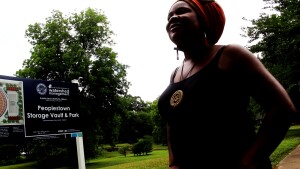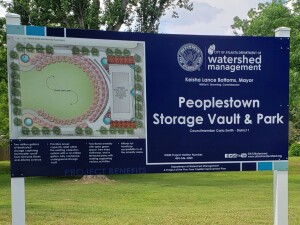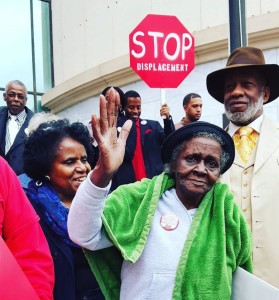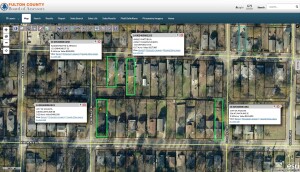Atlanta Moving Forward on Eminent Domain Park, despite Pending Appeals (UPDATE 1)
With additional reporting by Matthew Charles Cardinale. Photograph by Adrian Paulette Coleman.
 (APN) ATLANTA — On Thursday, June 04, 2021, with little to no fanfare, the City of Atlanta’s Department of Watershed staked a six-foot sign announcing the “Peoplestown Storage Vault and Park Project”, on the site where, by the the time project is completed, an entire block of Black families will have been displaced through eminent domain.
(APN) ATLANTA — On Thursday, June 04, 2021, with little to no fanfare, the City of Atlanta’s Department of Watershed staked a six-foot sign announcing the “Peoplestown Storage Vault and Park Project”, on the site where, by the the time project is completed, an entire block of Black families will have been displaced through eminent domain.
To date, 23 homes have been demolished by the City of Atlanta; and four homes remain on the chopping block while legal battles continue.
The sign affixed with the great seal of the City of Atlanta, prominently displays the names of Mayor Keisha Lance Bottoms; and Carla Smith, District 1 Councilmember.
 A design rendering of the city block, is captioned, “Grand water features and plaza spaces”, promising “a functional amenity with open green space, tree lined walkways and a terraced plaza with seating supporting various activities”.
A design rendering of the city block, is captioned, “Grand water features and plaza spaces”, promising “a functional amenity with open green space, tree lined walkways and a terraced plaza with seating supporting various activities”.
Noticeably missing from the rendering are four occupied homes still standing on the block; they are replaced in the rendering by miniature ponds and trees.
The remaining residents and their advocates are upset because the sign sends a message from the City that they are moving forward no matter what happens in court; no matter who is right or wrong.
Tanya Washington, a Georgia State University Law Professor and Peoplestown resident; and her husband and two children, are one of four families whose homes still stand on the block.
The other families are Bertha and Robert Darden; Dwayne and Arnold Adgar; and the family of the now-late Mattie Jackson.
UPDATE ON THE LITIGATION
 On October 31, 2016, Fulton County Superior Court Judge Craig Schwall condemned the Washingtons’ home, denying their challenge to the taking of the home, after the City’s case for taking the home had actually appeared to have fizzled in court.
On October 31, 2016, Fulton County Superior Court Judge Craig Schwall condemned the Washingtons’ home, denying their challenge to the taking of the home, after the City’s case for taking the home had actually appeared to have fizzled in court.
On August 30, 2017, Washington sought a new trial based on the fact that the City of Atlanta later admitted to having withheld thousands of pages of documents that undermined their case for taking the home.
On December 11, 2018, Judge Schwall denied her motion for a new trial, later certifying the matter for an immediate review by the Court of Appeals of Georgia.
On January 25, 2019, the Court of Appeals of Georgia denied Washington’s request for an immediate review, but, by law, they will still review an appeal once the lower case is complete.
On June 29, 2020, the City of Atlanta filed a proposed order to disburse 375,000 dollars, which had been held in escrow, as payment for the home – an amount the Court previously agreed to be fair market value.
 On October 05, 2020, Fulton County Superior Court Judge Paige Reese Whitaker granted the order, disbursing 375,000 dollars to Mortgage Electronic Registration Systems, Inc., apparently to pay off the remaining mortgage balance with the remaining amount to go to the Washingtons.
On October 05, 2020, Fulton County Superior Court Judge Paige Reese Whitaker granted the order, disbursing 375,000 dollars to Mortgage Electronic Registration Systems, Inc., apparently to pay off the remaining mortgage balance with the remaining amount to go to the Washingtons.
On April 08, 2021, the Washingtons, the Dardens, and the Adgars made a motion to consolidate their proceedings.
On May 10, 2021, the City of Atlanta opposed the consolidation of the cases.
The Washington case remains pending in Fulton County Superior Court because Washington has requested a jury trial on the issue of whether 375,000 dollars is adequate compensation for the home.
FAILED ORDINANCE BY BOND AND DICKENS
 In 2019, Councilmembers Michael Julian Bond (Post 1-at-large) and Andre Dickens (Post 3-at-large) introduced an ordinance to stop the eminent domain proceedings against the remaining residents.
In 2019, Councilmembers Michael Julian Bond (Post 1-at-large) and Andre Dickens (Post 3-at-large) introduced an ordinance to stop the eminent domain proceedings against the remaining residents.
The ordinance sat in committee, and then essentially expired at the end of the year. Either Bond or Dickens could have waived the automatic termination of the ordinance at the end of the year by making a motion; or could have reintroduced the ordinance at any time since it was terminated.
 “It’s heartbreaking what’s happening. It seems government is going backwards with regards to caring for the people. I heard the testimony of former City employees that said the engineering didn’t support condemning these homes. That’s why I introduced the legislation,” Bond told APN.
“It’s heartbreaking what’s happening. It seems government is going backwards with regards to caring for the people. I heard the testimony of former City employees that said the engineering didn’t support condemning these homes. That’s why I introduced the legislation,” Bond told APN.
When asked why he did not reintroduce the legislation, “I didn’t have the votes. I didn’t have the support,” Bond said.
Why not force the vote and get Councilmembers on record?
“I didn’t want to give people false hope if I didn’t have the votes,” Bond said.
Dickens did not respond to multiple requests for comment.
 Previously, Mattie Jackson’s home had been temporarily spared after activists rallied around the now-late senior who was an activist, in 2015, convincing then-Mayor Kasim Reed to declare that Ms. Jackson could stay in her home as long as she lived.
Previously, Mattie Jackson’s home had been temporarily spared after activists rallied around the now-late senior who was an activist, in 2015, convincing then-Mayor Kasim Reed to declare that Ms. Jackson could stay in her home as long as she lived.
Since Mattie Jackson died last year, in 2020, the home that is now still occupied by her children and grandchildren, is now back up to potentially face eminent domain proceedings which had been stalled while Mattie was alive.
Having survived the trauma of the demolition of 24 neighboring homes and exodus of their friends and neighbors, the families now worry the City will demolish their home before they’ve exhausted their legal remedies.
“We’d like for the subject matter of the litigation to remain until we have exhausted our legal options. That’s what we’re entitled to, especially in light of what we found, you know, this evidence that shows clearly and unequivocally that they didn’t need this property,” Washington told Atlanta Progressive News.
 The Washingtons’ one hundred year-old home is positioned more than 915 feet above sea level and there is no record of the home flooding in its history.
The Washingtons’ one hundred year-old home is positioned more than 915 feet above sea level and there is no record of the home flooding in its history.
“They can do what they need to do with the space they already have. It’s a design, not engineering specifications. Ponds can be positioned anywhere in the space,” she said.
Some Peoplestown residents seem to be happy, Washington said, summarizing their view as: “‘Ooh, we get to live across from a park and a pond.’ They value greenspace, but they don’t value the people who were displaced.”
Washington moved to Atlanta’s Peoplestown neighborhood Peoplestown in 2011 because of the community that was there. “I did not move here because there was going to be this park and it was going to raise the property value.”
Atlanta is “replacing Black faces with green spaces”, a growing concern in urban communities nationwide.
“Eminent Domain is real, and it often happens without people even having the opportunity to resist because the timelines are very short, it’s very expensive to challenge. Most lawyers will help you negotiate a settlement, but they won’t help you fight it.”
“Georgia actually has more protections for homeowners than most states, in the context of eminent domain. Atlanta City Council, as legislative authority, has the right to put some procedural safeguards in place, but the City didn’t enforce those protections,” Washington said.
“Our resistance isn’t just about us remaining in our houses. This is about setting a precedent for how Atlanta does business, and how they build parks and ponds. It’s about how they weigh people and neighborhoods in the calculus when they are designing development projects. Are we in the way or can we be part of the amenity and part of the enhancement?”
“I would also like for the City to make a commitment not to do this to other people. I would like for there to be some procedural rules that require that ordinances that are authorizing the use of eminent domain actually include the addresses, actually indicate whether people are living there, and that they follow all of the procedures that are available to protect homeowners.”
(END / Copyright Atlanta Progressive News / 2021)
CORRECTION and UPDATE 1: A previous version of this article stated that Prof. Washington has one child; in fact, she has two children. The article has been updated to reflect the correct information.